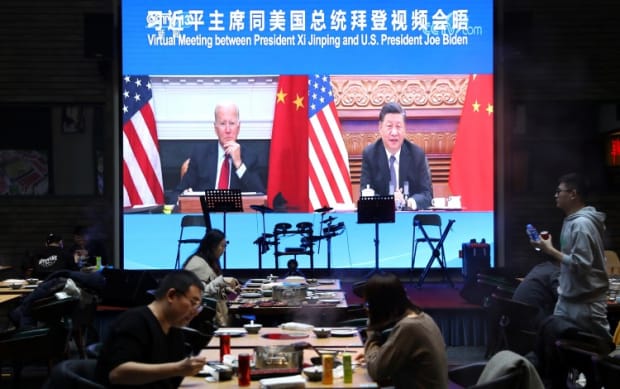The relationship between the United States and China has often been most fraught when the two nations are squabbling over their respective business interests.
In several cases over the last decade or so, both countries have used sanctions and tariffs to curb the other's business edge in the region.
The Chinese have often had a flexible approach to what they consider to be intellectual property.
Some recent studies estimate that Chinese hackers alone have siphoned off trillions of dollars worth of proprietary information from 30 multinational corporations doing business in the country.
"We're talking about blueprint diagrams of fighter jets, helicopters, and missiles," Cybereason CEO Lior Div told CBS News. "We saw them stealing IP of drugs around diabetes, obesity, depression."
One prominent example of the conflict was an attempt by former President Donald Trump to ban popular Chinese social media platform TikTok in 2020.
That decision was quickly reversed by the administration of President Joe Biden, but it illustrates perhaps the thorniest part of the Sino-American relationship.
Namely, how each country views proprietary technology, and which one will wind up on top as the leader in the world's tech ecosystem.
Now, major American tech player and venture capitalist Vinod Khosla is warning that this ongoing battle between the U.S. and China is likely to last for two decades, at least.

What Khosla Said
Khosla, known for his investments in cutting edge tech via VC firm Kleiner Perkins, made the comments during an interview on "Bloomberg Wealth With David Rubenstein."
In that conversation, Khosla said that the U.S. will continue to wage a full on “techno-economic war” with China for the next 20 years, as it attempts to finally gain the upper hand in who has the best, most innovative tech.
“The countries leading in technology will have tremendous economic power and hence, political influence,” Khosla told Bloomberg in a follow up interview.
“Likely this will be driven by innovation ecosystems, which means startups,” he wrote in an email to the news service.
What Does a 'Techno-Economic War Look Like?
The TikTok fracas was a perfect example of this tug-of-war battle.
That's primarily because by the time Trump officials had become aware of what TikTok was and how it was involved with other American companies, it was already very popular in the U.S.
So by the time Trump had deemed it a threat to national security, most Americans who liked the app had downloaded it quite a while before.
Thus once the ban went into affect, it didn't do much at all to curb usage of the app itself.
That also applied to another Chinese product, WeChat, which had become the default messaging app for much of the world.
Advocates of removing the bans were quick to point out that no matter how much American authorities wrestle with Chinese products, they still have the Constitution to contend with.
"President Biden is right to revoke these Trump administration executive orders, which blatantly violated the First Amendment rights of TikTok and WeChat users in the United States," Ashley Gorski, a senior lawyer at the American Civil Liberties Union (ACLU), told the BBC at the time.
"The Commerce Department's review of these and other apps must not take us down the same misguided path, by serving as a smokescreen for future bans or other unlawful actions."
Khosla Makes Some More Predictions
Overall, both American and Chinese investors can expect to see both countries play rough as they try to outdo one another's tech prowess.
Khosla made headlines earlier this year when he said on a health care podcast that China was more likely to take bigger risks to win an advantage.
“[China] was willing to take on the cost of human life to have the best tech," Khosla said. "The western world isn’t quite like that.”
For now, Khosla said that the markets outside of China have done an impressive job of keeping themselves competitive, with American investors gaining a crucial advantage for policymakers.
"I’m particularly proud of the role venture capital has played in making the US economy competitive," he said in the interview June 14.
"I actually think the most important part of patriotism is to develop American technology because I think we will have a techno-economic war over the next 20 years, globally," he said.
"And the U.S. venture community can make a large difference in that."







